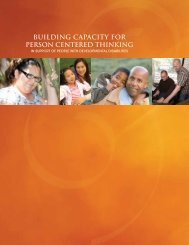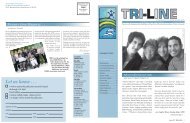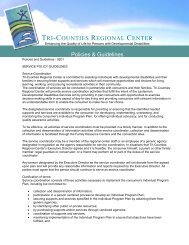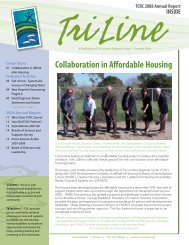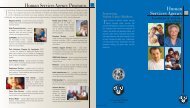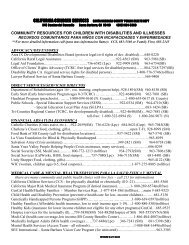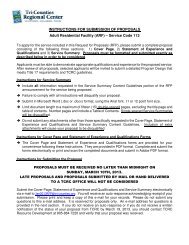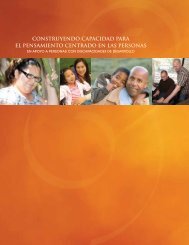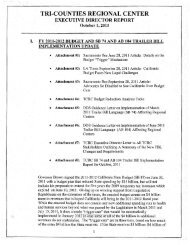TCRC Tri-Line Newsletter - Winter 2008 - Tri-Counties Regional ...
TCRC Tri-Line Newsletter - Winter 2008 - Tri-Counties Regional ...
TCRC Tri-Line Newsletter - Winter 2008 - Tri-Counties Regional ...
You also want an ePaper? Increase the reach of your titles
YUMPU automatically turns print PDFs into web optimized ePapers that Google loves.
(Dis)ability Through Education and Action<br />
by Jennifer L. Dwyer, Peer Advocate, San Luis Obispo<br />
Being a participant in Partners in Policymaking®, is a little like looking<br />
at my favorite painting. At first, as people from all over central<br />
California file into the large conference room of the Bakersfield<br />
Inn and Suites, the larger picture remains<br />
out of focus; if looked at too closely, it<br />
appears to be a mass of unconnected,<br />
slightly dizzying dots. However, over<br />
time, the people that began the journey<br />
as virtual strangers, have, through the<br />
experience they shared, gained a little<br />
perspective. United in a common purpose,<br />
like any family, we gathered for a weekend<br />
that, while challenging, felt an awful like a<br />
Sunday in the Park.<br />
“Partners in Policymaking has given me<br />
the practical tools to use to speak up for<br />
those who cannot speak for themselves,”<br />
Esther Bautista, mother of 5-year-old<br />
Bethany, a person served by <strong>Tri</strong>-<strong>Counties</strong> <strong>Regional</strong> Center, Santa<br />
Maria, said. “It’s high time that someone speaks out for the injustice<br />
they have suffered and work to promote a more accessible<br />
world.”<br />
Partners in Policymaking (PIP) is an internationally recognized<br />
training program designed to empower people with disabilities,<br />
their families, and other members of their immediate support<br />
network. Through a series of eight weekend-long seminars,<br />
participants learn about the contemporary lives of the one in five<br />
Americans that, like their loved one, find themselves disabled in<br />
some way. They also learn about the historically discriminating<br />
treatment that spurred the earliest disability rights’ activists into<br />
action. Like those who came before them, it is believed that Partners<br />
in Policymaking graduates, once armed with the educational<br />
tools, will actively work to change the perception of a “life with a<br />
disability.”<br />
The program, funded by a 2006 State Council on Developmental<br />
Disability grant, is intended to teach those with disabilities—and<br />
the people who love, live, and work with them—how to advocate<br />
for individual, social, and legislative change.<br />
“Half of our participants are ‘self-advocates’, or those who have<br />
disabilities themselves,” Linda Landry, of the Family Resource<br />
Centers Network of California (FRCNCA) said. “The other half is<br />
made up of those who love and [emotionally and physically]<br />
support them.”<br />
Jennifer Dwyer receives Graduation Certificate<br />
time in 13 years, on October 18, the 40-member class of <strong>2008</strong><br />
graduated from the program. Parents, personal assistants, and selfadvocates<br />
received diplomas and lapel pins as a symbols of their<br />
collective achievement.<br />
“Through education, we have become more<br />
aware of how to properly demonstrate respect<br />
toward people with disabilities,”<br />
Denise Martinez, a self-advocate from San<br />
Luis Obispo, said.<br />
Monthly, participants—affectionately<br />
dubbed “PIP peeps” by me—converged<br />
upon the Doubletree. Coming from as far<br />
away as Madera and San Mateo, participants<br />
did everything from learning about the appropriate<br />
use of assistive technology devices,<br />
to staging a mock legislative hearing at the<br />
state Capitol. With over 100 hours of learning<br />
behind the newly graduating class, the energy in the room was<br />
one that, thanks to the knowledge gained, removed the ‘dis’ in<br />
“disability”, and shifted the focus to abilities, instead.<br />
“This graduation represents another class of advocates ready to<br />
act on issues important to the disabilities community,” Jim Lockwood,<br />
coordinator of PIPCA, said. “Next year, Partners in Policymaking<br />
California will be training our third class of advocates in<br />
the southern California region,” he said. “This will mean that, in<br />
three years, PIPCA will have trained more than 100 advocates<br />
from across the state of California.”<br />
Participants’ expenses-about $8,000 each-included lodging and<br />
attendant care costs, if needed. The California State Council on<br />
Developmental Disabilities funds the entire cost of the program<br />
through a grant to the aforementioned members of the California<br />
Collaborative. The Collaborative organizations commit staff<br />
time and resources to the oversight and implementation of the<br />
Partners in Policymaking program.<br />
Originally modeled after a curriculum generated by the Governor’s<br />
Council of Minnesota 21 years ago, Partners California has<br />
not had an easy road. Thanks to the dedication of many organizations<br />
— including People First of California, the American<br />
Association of Intellectual and Developmental Disability, and the<br />
Family Resource Centers Network of California— for the second<br />
Partners in Policymaking Graduating Class<br />
WINTER <strong>2008</strong> tri-line | 5



